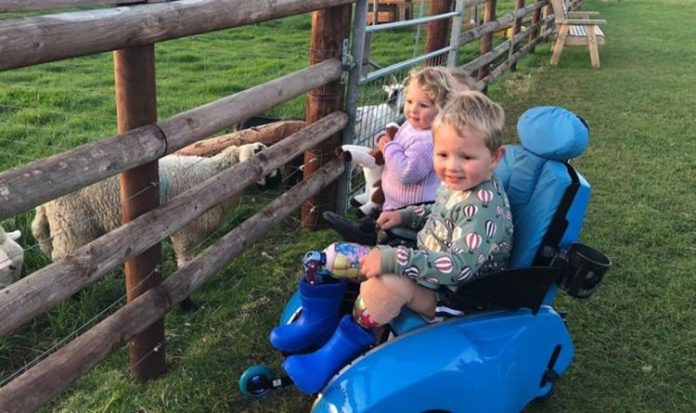At the start of the year, little William Reckless, from Nottingham, began to feel unwell. At first his family thought he had picked up a bug at nursery but soon his condition started to deteriorate. He was taken to hospital, but what his mother Gemma, 29, had suspected was flu, turned out to be sepsis.
William was put into an induced coma and for the first couple of days, doctors feared he would not survive.
While the little boy bravely fought the bug, he had to subsequently have both his legs and nine of his fingers amputated.
Leaving hospital and arriving back home was a hard adjustment for William and his family.
His mum said it had first been heartbreaking to see the youngster struggle.
Mrs Reckless, a police officer, said: “Coming home from hospital, it was devastating to see his independence gone.
“Reliant on us again and not able to chase round after his younger sister.”
And she added: “We’ve always been a family that love to spend a lot of time outdoors; camping, dog walking, adventure days out.”
But just as they the family thought their lives would forever be difficult, in June William received a wheelchair that would change his life once more – this time for the better.
An occupational therapist at the hospital alerted the Reckless family to a specialist wheelchair company, TinyTrax.
The Bristol-based firm uses ground-breaking new technology to create wheelchairs for children aged between two and 10.
It uses a special lightweight design which makes them easily transportable in a normal family car.
The chair is designed to adapt and adjust as the child grows, with no extra equipment needed.
The family raised the money to fund the wheelchair themselves (how much) and now want to alert others after seeing how little William’s life has been transformed.
His overjoyed mum said: “Tinytrax has given William back his freedom. He can race off in front, his sister running alongside, no longer reliant on us to push him…
“We cannot imagine how we would have coped this year without it”.
A spokesman for TinyTrax said the new design aimed to give children like William a ‘no barriers’ way of approaching life.
And despite his amputations, William himself can now control the wheelchair and it has enabled him to gain back his independence.
The lightweight nature of the wheelchair means it can also travel over rough terrain, and William has managed to adapt to it very quickly.
“We’ve tested this bit of kit to its limits, camping fields, beaches, muddy country paths and it never fails to impress,” Mrs Reckless said.
“William can handle the steering with expert precision and it’s turning circle is so brilliant he can negotiate around busy shops and narrow aisles with no issues at all.’
After becoming mobile again, William has shown such strength and determination at school in September.
“It’s made school life so much easier. He can join in with playground games and not feel left behind,” Mrs Reckless added.







